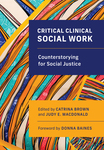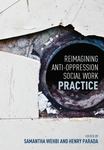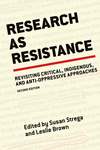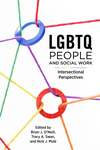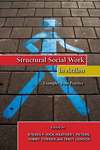We don’t actively support Internet Explorer
It appears that you are using Internet Explorer, which has been discontinued by Microsoft. Support has ended for versions older than 11, and as a result you may face security issues and other problems when using it.
We recommend upgrading to a newer browser such as Firefox, Google Chrome, or Edge for a much better experience across the web.
While this site may work with Explorer, we are not testing and verifying it, so you may run into some trouble or strange looking things.
Reimagining Anti-Oppression Social Work Research
Edited by Henry Parada, Samantha Wehbi
Overview
Reimagining Anti-Oppression Social Work Research explores the challenges, tensions, and possibilities of engaging with anti-oppression epistemology in social work research. Through in-depth discussion of methodologies such as phenomenology, surveys, decolonizing research principles, autoethnography, and critical arts-informed research, the authors provide insights about the application of these approaches to studies with marginalized populations and on a variety of social issues.
Outlining principles for engaging with communities, research in organizational contexts, and the importance of fluidity and practices of unknowing, this edited collection invites readers to reflect critically about research frameworks. The authors explore the complexities of research on topics such as whiteness, racism, disability, and trans experiences, as well as working within feminist contexts and institutional social service settings. An ideal resource for social work students and scholars, this insightful and highly accessible volume highlights the value of anti-oppressive research for social change.
Features
- provides a comprehensive look at anti-oppression approaches to social work, when paired with Reimagining Anti-Oppression Social Work Practice
- offers real case studies and examples
- accessible and appropriate for undergraduate courses
Table of Contents
Preface: Anti-Oppression Research: Epistemologies, Principles, Directions
Henry Parada and Samantha Wehbi
Section I: Conversations and Negotiations: Processes of Engaging with Community
Chapter 1. Taking the Pulse, Making Trans People Count: Quantitative Method as Social Justice Strategy in the Trans PULSE Project
Jake Pyne, Greta Bauer, Rebecca Hammond, and Robb Travers
Chapter 2. Anti-Oppression Qualitative Research Principles for Disability Activism: Reflections from the Field
Yahya El-Lahib
Chapter 3. Critical Arts-Based Research: An Eff ective Strategy for Knowledge Mobilization and Community Activism
Purnima George
Chapter 4. The Use of Photography in Anti-Oppressive Research
Samantha Wehbi
Section II: Unfolding Anti-Oppressive Research in Organizations
Chapter 5. Process as Labour: Struggles for Anti-Oppressive/Anti-
Racist Change in a Feminist Organization
Ken Moff att, Lisa Barnoff , Purnima George,
and Bree Coleman
Chapter 6. Carrying Out Research on Whiteness, White Supremacy, and Racialization Processes in Social Service Agencies
June Ying Yee
Chapter 7. A Research Design for the “Messy Actualities” of Restructured Social Work
Kristin Smith
Section III: Valuing Fluidity and Unknowing
Chapter 8. Phenomenology as Social Work Inquiry: Parallels and Divergences with Anti-Oppressive Research
Susan Preston and Lisa Redgrift
Chapter 9. Unpacking Liminal Identity: Lessons Learned from a Life on the Margins
May Friedman
Chapter 10. Decolonizing a Graduate Research Course …
Moving Away from Innocence and Ignorance
Susan Silver
References
Index



